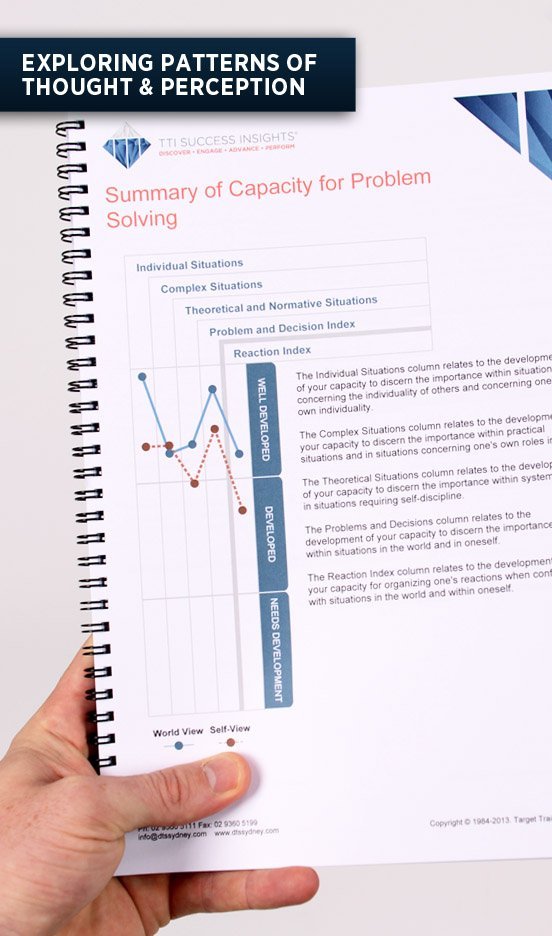Acumen
The Capacity to Perform
The Acumen Capacity Index assessment is based on Dr. Robert S. Hartman’s Theory of Axiology, the study of values and value judgments, or how a person analyzes and interprets experiences. Acumen refers to a person’s keenness or depth of perception and is used to identify both how they think and make decisions and how they are likely to react in any given situation.
Acumen is measured in three dimensions of thought: Intrinsic, Extrinsic, and Systemic in both the world and self-view.
A person’s acumen also helps clarify natural abilities or capacities and is directly related to their level of performance. The stronger a person’s acumen, the more aware they are of their reality in both their external and internal world.
With the Acumen Capacity Index assessment tool we examine how six areas are dimensionally balanced as related to internal and external factors:
Internal (Self View):
How clearly we see ourselves, our strengths, limits and areas for improvement.
- Sense of inner worth
- A solid sense and understanding of one’s reality
- The ability to give yourself credit and respect for the person you are
- Understanding self-identity
- Comfort in own “skin”
- Knowledge of who you are or your own uniqueness
- Clarity of personal strengths, weaknesses, accomplishments and potential
How clearly we see and separate our roles in life, be it as a manager, team or family member.
- Harmony and balance between personal and professional roles
- Clarity of various role duties and responsibilities
- Role fulfillment
- Self-identification with roles
- Understanding one’s place in the world
- Understanding who one is
How clearly we see our future, the goals we have, and the path toward them.
- Self-organization and discipline
- Self-image and who you want to become
- Seeing unity with the self you are becoming in the future
- The ideal self
- Understanding of self-conduct and duty
- Understanding of who and what you ought to be
- Ability to develop a path to reach the ideal self
- Understanding of the present and its application to the envisioned future
- Ability to bring one’s envisioned future into the present
External (World View):
How clearly we see others, their strengths, limits and areas for improvement.
- Understanding of people, social friends and acquaintances
- Ability to be sensitive to and empathize with the life situations of others
- Interpersonal relationships
- Clearly understand people
- Ability to see things from a people perspective
- Ability to appreciate others
- Ability to apply understanding of people
- Perceiving the needs of others
- Ability to adapt to different people
How clearly we see cause and effect, the connection between actions and results.
- The tangible and observable
- Practical comparison of things and tasks
- Surrounding events and processes
- The functions of work
- Projects and attention to detail
- Understanding of work
- Completing processes of labor
- Ability to adapt to different situations as they relate to tasks or things
- Understanding of all available resources
- Ability to utilize all available resources
How clearly we see systems, structure and authority.
- The ordering mechanisms of understanding
- Authoritative order: law, policies, rules and procedures
- Thinking and planning
- All concepts and ideas
- Ability to understand corporate objectives
- Understanding of policies, plans or superior changes
We also measure:
- Clarity of Performance and Situational Awareness
- Capacity for Problem Solving
- Reaction Index
- Balanced Decision Making
- Concentration Index
- Attitude Index
For sample reports click here.
For more about TTI Success Insights® assessments click here.
Additional Assessments
- Behaviors (DISC)
- Motivators
- Competencies (DNA)
- Emotional Quotient™
- TriMetrix® HD
- ODSurveys Plus®
- Stress Quotient™
- Sales Skills Index™


